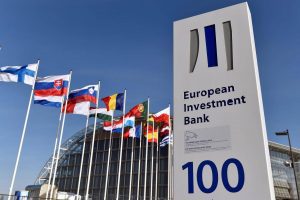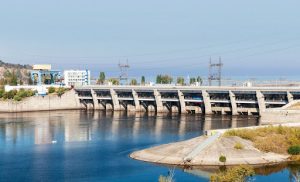
Тhe international bus carrier Ecolines, which includes the Ukrainian carrier Autolux, resumes traffic from Kyiv to Moscow from July 9.
According to the company’s website, also from July 11, the carrier will resume trips from Kyiv to St. Petersburg.
As reported, Ecolines launched trips from Kyiv to Wroclaw on June 22, from Kyiv and Odesa to Minsk on June 25, from Kyiv to Gdansk and Torun on June 25, and to Zielona Gora on July 1.

The European Investment Bank (EIB) could issue EUR340 million to Ukraine under the Recovery Program, according to information on the bank’s website.
“The aim of the Ukraine Recovery Program focuses on creating, restoring and improving public buildings (including administrative buildings, schools, medical centers and hospitals and other social infrastructure), governmental roads and bridges, supply of utilities (water supply and sewerage) in Donetsk and Luhansk regions under control of the Ukrainian government as well as the four surrounding oblasts (Kharkiv, Dnipropetrovsk, Zaporizhia and Kherson) and city councils in other regions countrywide enabling them to cope with the impacts of a heavy influx of internal displaced people,” the report says.
“The project builds on the successful Ukraine Early Recovery project (EUR200 million, fully allocated), one of the first measures under the EIB Special Action Plan Ukraine providing EUR3 billion loans in 3 years,” according to the document.

Electrotyazhmash together with its main partner Turboatom (Kharkiv) sees an opportunity to increase the order portfolio for JSC Ukrhydroenergo, which operates all major hydroelectric power stations in the Ukrainian sections of the Dnipro and Dniester Rivers, by two to three times in the next two years, Viktor Busko, who was suspended at his request from performing the duties of director general of the enterprise, has said.
“At present, together with the main partner Turboatom, a project is underway to modernize Ukrhydroenergo’s turbo generating equipment, in the future it is planned to jointly participate in no less large projects at Ukrainian nuclear power plants. The prospect of working with Ukrhydroenergo is very serious. We see an opportunity to increase the portfolio of orders by two to three times over the next two years,” Busko told Interfax-Ukraine.
He recalled that such large projects are exhibited according to international procurement procedures and attract all the world’s top manufacturers of generators and turbines.
“However, we are confident in our abilities and Electrotyazhmash has every chance not only to compete, but also to receive these orders, subject to careful preparation of documents and a very balanced approach to pricing its services. Our products are not inferior in quality, while there’s not a single reason why our price should be higher than the Austrian or American,” he said.
He said that there were debts for the delivered products in the Electrotyazhmash-Turboatom-Ukrhydroenergo supply chain.

Enwell Energy plc (formerly Regal Petroleum) with assets in Ukraine in the second quarter of 2020 increased its average daily production of hydrocarbons at the Mekhediviska-Golotvshinska (MEX-GOL), Svyrydivske (SV) and Vasyschevskoye (VAS) gas and condensate fields by 12.5%, or 510 barrels of oil equivalent (boepd) compared to the second quarter of 2019, to 4,580 boepd.
According to Enwell’s report on the London Stock Exchange, in particular, the average daily production of hydrocarbons in April-June of this year on MEX-GOL and SV amounted to 3,980 boepd (27.8% more from Q2, 2019), VAS some 600 boepd (37.1% less from Q2, 2019).
“Overall production volumes in Q2, 2020 increased by approximately 12.5% compared with Q2, 2019, having received a significant boost in May 2020, when the SV-54 well in the SV field commenced production testing. However, a decline in production rates from the VAS-10 well in the later part of 2019 impacted overall production at the VAS field in 2020. As a consequence, during Q1, 2020, compression equipment was installed to stabilize production from the VAS-10 well, with a longer term plan to undertake a workover of the well to access an alternative reservoir horizon,” the report says.
The total natural gas production on the three fields in April-June 2020 reached 586,160 cubic meters per day (up by 12.5%), condensate some 683 barrels per day (10.9% more), liquefied natural gas (LPG) some 304 barrels per day (19.4% more).
“Preparations continue for the spudding of the SV-25 well in Q3, 2020, and planning is also underway for a further well or sidetracking of an existing well in the SV field. At the VAS field, planning is continuing for a new well to explore the Vvdenska (VED) prospect within the VAS license area,” according to the document.

Тhe number of tourists who visited Odessa in June of this year returned to the pre-quarantine level, according to geo-analytics of the Vodafone Ukraine mobile communications operator/
The press service of the company reported that on Constitution Day tourists in Odesa were twice as much as on March 8. Most tourists came from Kyiv region. Residents of Odesa region were in second place, followed by Kherson, Zaporizhia and Dnipropetrovsk regions.
“Judging by the increase in Internet traffic and the number of 4G users, in general, domestic tourism in Ukrainian sea resorts in Odesa, Mykolaiv and Kherson regions has grown by 30% compared to the same weekend last year,” the operator said.
According to Vodafone Ukraine, coastal resort towns and villages of the Sea of Azov in Zaporizhia and Donetsk regions showed even greater dynamics.
Vodafone Ukraine said that the coastal villages of Donetsk region are among the new destinations with growing popularity among tourists: Bilosaraiska Kosa (177% up), Yalta (124% up) and Urzuf (101% up), which showed the highest traffic growth.
“The forecast of resort attendance based on their own data analytics allows the company’s engineers to provide sufficient network capacity – using stationary equipment and mobile towers – in hot spots, taking into account the organic growth of traffic,” Vodafone Ukraine said.

Ferrexpo plc, whose main assets are Ukrainian iron ore producers Poltava and Yeristovo mining and processing plants, raised iron ore pellet production 4.6% year-on-year in H1, 2020, to 5.598 million tonnes, the company said in a press release.
Output of pellets with 65% Fe-content grew 7.1% year-on-year, to 5.5 million tonnes while output 62% Fe fell 54.4%, to 98,000 tonnes.
Ferrexpo did not produce pellets from third-party feedstock.
Pellet production rose 5.4% quarter-on-quarter in Q2, 2020, to 2.873 million tonnes, including 2.848 million tonnes of 65% Fe, up 7.4%, and 24,700 tonnes of 62% Fe, down 66.3%.
The company’s facilities “continue to operate with minimal impact on operations to date, and the company continues to closely monitor its workforce,” Ferrexpo said in a COVID-19 update. “The infection rate in the local communities surrounding the company’s operations remains low,” it said.
The London-listed Ferrexpo plc owns 100% of Ferrexpo AG, which owns 100% of each of Poltava Mining and Yeristovo Mining and 99.9% of Belanovo Mining. Ferrexpo’s main customers are steelmakers in Austria, Germany, Japan, South Korea, Taiwan, China, Slovakia, the Czech Republic, Turkey, Vietnam and the United States. Pellet production grew 0.8% to 10.519 million tonnes on 2019.